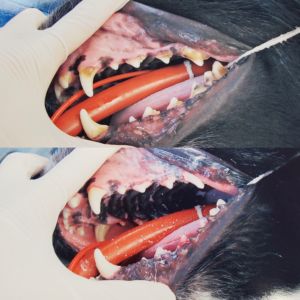Periodontal Disease
Did you know that periodontal disease is the number one heath problem in small animals? By age two, 70% of cats and 80% of dogs have periodontal disease to some degree. Despite this, it may be the most undertreated disease in our patients. This is because the signs of periodontal disease are not always outwardly obvious, especially to pet owners! Veterinarians often see and treat cases of periodontal disease when it is very advanced because our pets are so good at hiding the symptoms. This is why it is so important to bring your pets in for an annual physical exam!
What exactly is periodontal disease? In general, it is an inflammatory disease that affects the soft and hard structures that support the teeth. It occurs in two stages: gingivitis and periodontitis.
Gingivitis is the initial stage in which inflammation is confined to the gum tissue. The inflammation is caused by bacteria within plaque, which is a matrix of substances from the saliva. Calculus (or tartar) is plaque that has become hard from minerals in the saliva.
It is important to note that this stage is reversible with proper treatment! A thorough, professional teeth cleaning and regular home care can reverse the effects of gingivitis.
If untreated, gingivitis progresses to periodontitis, the later and more destructive stage of periodontal disease.The inflammation reaches the deeper supporting structures of the tooth, leading to attachment loss. Bone loss occurs, which is irreversible and permanent! The end stage of periodontal disease is loss of the tooth.
Some aspects of periodontal disease can be seen on an exam of an awake animal during a regular office visit. However, the periodontal structures are best evaluated with the pet under general anesthesia with special tools to probe and clean the teeth.
There are many potential treatments of advanced periodontal disease, from surgical extraction of diseased teeth to root canal therapy and other such procedures geared toward preserving the tooth. Oral surgery can be very costly. In light of that, some owners may ask, why not just let the teeth fall out on their own?
The problem is that periodontal disease has severe local and systemic consequences. Locally, diseased teeth can result in infections of the soft tissue and bone, fistulation into the nasal cavity, and jaw fractures. These are all very painful conditions that our pets endure, often silently! Systemically, the inflammation around the teeth allows bacteria to enter the blood stream. It can then travel to major organs such as the heart, liver, and kidneys and cause damage.
Preventing periodontal disease is very important. If your pet has gums that bleed after chewing on toys, or has bad breath, these are early signs of periodontal disease. “Doggy breath” is not normal! If you think your pet may have periodontal disease, schedule an appointment for an exam with your veterinarian. Vets want to keep your pets healthy, happy, and pain-free!
